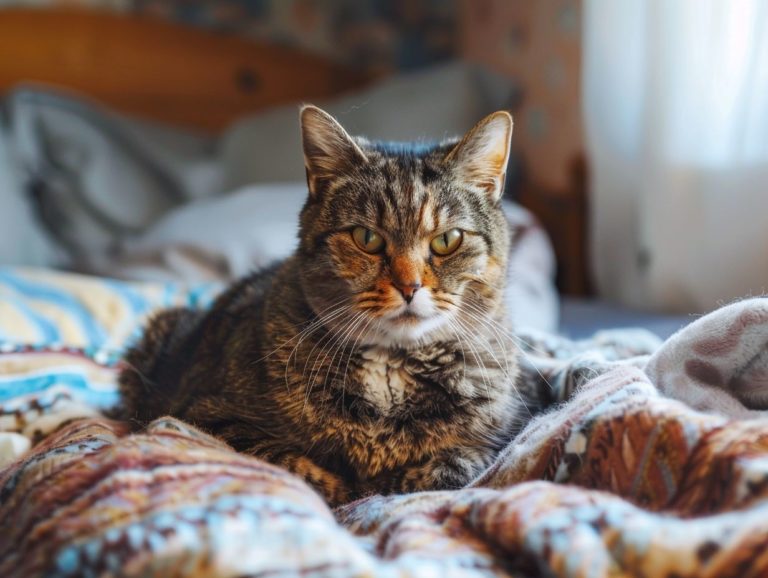Senior Cat Insurance Myths Vs Facts
Understanding the importance of healthcare for aging cats is widely recognized, with senior cat insurance being a crucial element. This guide on senior cat insurance aims to explore and clarify the myths and facts associated with it, dispelling common misconceptions. It will delve into the various benefits and coverage options available, assisting in choosing the most suitable insurance policy for your senior cat. Additionally, it will provide advice on optimizing the benefits of your senior cat insurance to ensure your feline companion receives the necessary and appropriate care.
Key Takeaways:
Understanding Senior Cat Insurance
Senior cat insurance is crucial for pet owners seeking to safeguard the well-being and health of their aging feline companions. As cats grow older, they are more susceptible to ailments such as arthritis, kidney disease, dental issues, and cancer. Dealing with these health conditions often involves costly veterinary appointments, medications, and specialized care.
Senior cat insurance is highly beneficial for pet owners as it offers them peace of mind, knowing they can afford essential treatments for their cherished pets without facing financial strain. By providing insurance coverage for senior cats, pet owners can take proactive steps to maintain their pets’ health and promptly address any new health challenges, ultimately enhancing the animals’ quality of life.
What is Senior Cat Insurance?
Senior Cat Insurance is a specialized pet insurance tailored to address the distinct health needs of aging cats. It provides coverage for veterinary visits, accidents, illnesses, and other health concerns that are prevalent in older felines.
With advancing age, cats are prone to developing conditions like arthritis, dental issues, kidney problems, and cancer. Senior cat insurance assists in covering the expenses related to diagnosing and treating these ailments.
Typical coverage options encompass medications, diagnostic tests, surgical procedures, and even end-of-life care, enabling pet owners to handle the expenses of caring for their senior cats without incurring financial strain.
Myths about Senior Cat Insurance
There are common myths about Senior Cat Insurance that can lead to misunderstandings about the types of insurance coverage and benefits available for aging cats from insurance policies. It is crucial to debunk these myths so that pet owners can make informed decisions when it comes to providing financial protection for their senior cats.
One prevalent myth is that coverage is limited for older cats, but in reality, many insurance providers offer plans specifically for senior cats that include coverage for chronic conditions and routine care. Another misconception is about pre-existing conditions, with some believing these are never covered. While many senior cat insurance policies have exclusions for pre-existing conditions, some do provide coverage, so it is essential to read the details of each policy.
The cost of insurance for senior cats may vary, but the potential significant savings on unexpected vet bills must be considered, along with the peace of mind that comes with having your feline companion covered.
Debunking Common Misconceptions
Clearing Up Common Misconceptions about Senior Cat Insurance is essential in helping pet owners recognize the significance of insurance for their aging feline companions. Dispelling myths regarding coverage options, costs, and reimbursement percentages can enable pet owners to make informed choices.
Misunderstandings about coverage variations: Contrary to belief, senior cat insurance can cover chronic conditions, wellness or routine care, and specialized treatments. While pre-existing conditions may not always be covered, some insurance plans do offer benefits for such conditions, making it crucial to review policy terms carefully. Learn more about what vets wish you knew about senior cat insurance.
Misunderstandings about costs: It is a misconception that senior cat insurance is prohibitively expensive. On average, pet insurance for a senior cat costs between $20 and $50 per month, providing a cost-effective solution when considering veterinary expenses and monthly premiums. For more information, check out the common misconceptions debunked.
Misunderstandings about reimbursement percentages: Some believe that insurance will cover the entire cost of veterinary bills or that insurance companies may try to avoid covering costs. However, insurance companies are mandated to reimburse the agreed-upon percentage of veterinary bills, regardless of the cat’s age, and are legally bound to honor these terms.
Misunderstandings about reimbursement speed: Contrary to the notion that insurance companies delay claim payouts, the average reimbursement time is typically within two weeks.
Misunderstandings about waiting periods: Waiting periods for coverage for senior cats are often seen as excessively long, but the average waiting period is 14 days for illness and 48 hours for accidents.
Misunderstandings about insurance options: There is a misconception that there are limited insurance options for senior cats. In reality, all cat insurance companies offer policies tailored for senior cats, providing a range of choices for pet owners to select the most suitable policy for their specific needs.
Facts about Senior Cat Insurance
Senior Cat Insurance provides comprehensive coverage and benefits that insurance plans offer to cater to the health and well-being of aging feline pets. These are crucial aspects for pet owners to grasp when seeking the best care for their senior cats.
Senior cat insurance presents a variety of coverage options that can be advantageous for owners of older cats, including coverage for common issues that impact aging felines such as arthritis, dental problems, and age-related diseases. A key feature of the plan is the reimbursement details, ensuring that pet owners receive financial assistance when seeking necessary veterinary care for their senior cats. This financial support brings peace of mind, enabling pet owners to focus on providing a high-quality life for their aging feline companions.
Benefits and Coverage Options
Insurance plans for senior cats offer a range of benefits and coverage options tailored to meet the specific needs of older felines, providing financial security and peace of mind for cat owners.
As cats age and enter their senior years, they often require more frequent vet visits and specialized care. Senior cat insurance typically includes coverage for various medical expenses such as routine check-ups, vaccinations, dental care, and treatment for chronic conditions.
Additionally, these plans can help offset the costs of emergency vet visits, surgeries, and prescription medications. Selecting the appropriate coverage for your senior cat ensures they receive the necessary care to support their health and well-being throughout their golden years.
Choosing the Right Insurance Plan for Your Senior Cat
When choosing the right insurance plan for your senior cat, several factors come into play, such as the cat’s age, health conditions, coverage restrictions, and various other considerations that pet owners must evaluate to meet their pet’s needs and select the suitable policy.
For senior cats, it is important to look for insurance plans specifically tailored for older felines, considering that pre-existing conditions may impact available coverage options. Understanding the limitations and restrictions of a plan is crucial to ensure that your senior cat receives necessary care without unexpected expenses.
Pet owners should compare different policies to find the most comprehensive coverage and protection for their senior cat.
Factors to Consider
When selecting an insurance policy for a senior cat, coverage comparisons, deductible options, and coverage exclusions are three key factors that influence the financial protection provided. These factors play a crucial role in determining the level of financial security for addressing various medical and healthcare needs of your pet.
By comparing different insurance options, pet owners can gain insight into the extent of coverage offered, ensuring that potential veterinary expenses are sufficiently covered. Choosing an appropriate deductible is vital to strike a balance between premium costs and out-of-pocket expenses. Understanding coverage exclusions is essential to avoid any unexpected surprises in the future.
Through a thorough review of the details in insurance policies, pet owners can guarantee that their aging feline companions receive essential medical care without facing financial strains.
How to Make the Most of Your Senior Cat Insurance
To maximize your senior cat insurance, it is important to understand the coverage details, prepare for potential pet emergencies, and utilize the policy effectively to ensure timely and efficient care for your elderly cat. By following these tips, you can optimize your insurance benefits for comprehensive health coverage for senior cats.
Understanding your policy is key, as requirements for care may include vaccinations, dental coverage, and treatment of specific chronic conditions that are more common in older animals. Without a clear understanding of what your policy covers, you may make decisions about your pet’s healthcare that are not in its best interest.
Being prepared for emergencies is also crucial. Having a designated pet emergency kit with a carrier for transportation readily available and knowing the location of the nearest 24-hour veterinary clinic can be lifesaving in urgent situations. Recognizing what constitutes an emergency and what can wait until the next day, as well as being aware of common emergencies in cats, will enable you to respond appropriately.
Understanding the importance of timely care is essential, as swift action can be critical for your pet’s health. Having insurance can give you the confidence to seek prompt medical attention at the first sign of trouble, rather than delaying and risking a more serious condition. Relying on insurance coverage can help prevent costly delays in necessary tests and procedures in the event of a severe illness.
Tips for Maximizing Coverage and Savings
To maximize coverage and savings with Senior Cat Insurance, pet owners should strive to balance insurance costs with the financial well-being and care of their aging cats. The following tips can help ensure that seniors receive the attention they need.
Optimize senior cat insurance coverage by selecting plans that include wellness exams and preventive care. Taking a proactive approach to your cat’s health can aid in early detection and treatment of issues, potentially lowering the need for costly treatments in the future.
Inquire about discounts for insuring multiple pets and consider enrolling in auto-pay to potentially reduce premiums. Maintaining a healthy weight for your senior cat is essential. Providing proper nutrition and regular exercise can help prevent potential health issues that may require expensive medical care.
Frequently Asked Questions
Is senior cat insurance necessary?
Yes, senior cat insurance can help cover unexpected medical expenses for older cats that may have age-related health issues.
Is it true that senior cats can’t get insurance?
No, there are insurance options available specifically for senior cats, with coverage tailored to their needs.
Do senior cats have to undergo a medical exam to get insurance?
It depends on the insurance provider. Some may require a medical exam, while others offer policies without one for senior cats.
Will the cost of insurance increase as my cat gets older?
Typically, yes. As cats age, they are more prone to health issues, so insurance premiums may increase to reflect that.
Does senior cat insurance cover pre-existing conditions?
It depends on the insurance provider and the specific policy. Some may have exclusions for pre-existing conditions, while others may offer coverage but with limitations.
Are there any benefits to getting insurance for my senior cat?
Yes, senior cat insurance can provide peace of mind knowing your cat’s medical expenses will be covered, and can also help with managing the costs of routine care in their later years.

